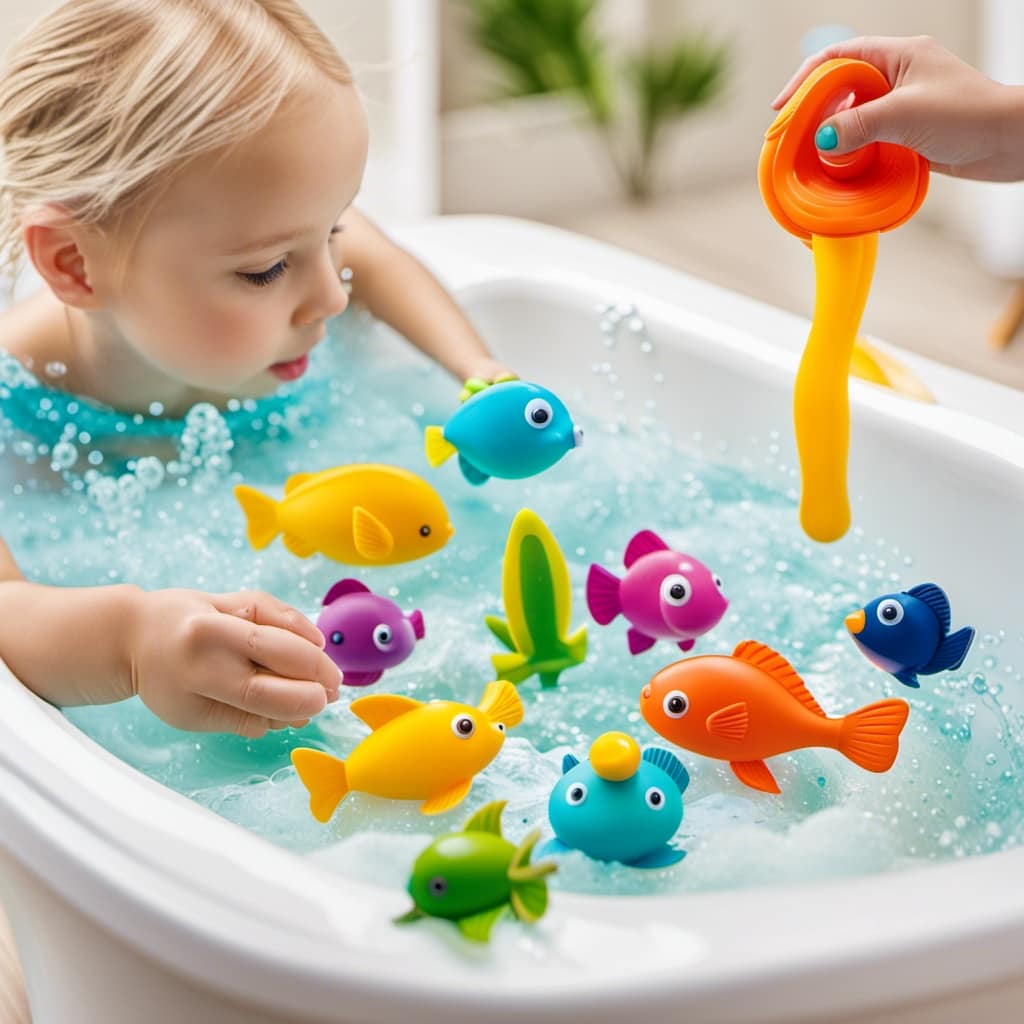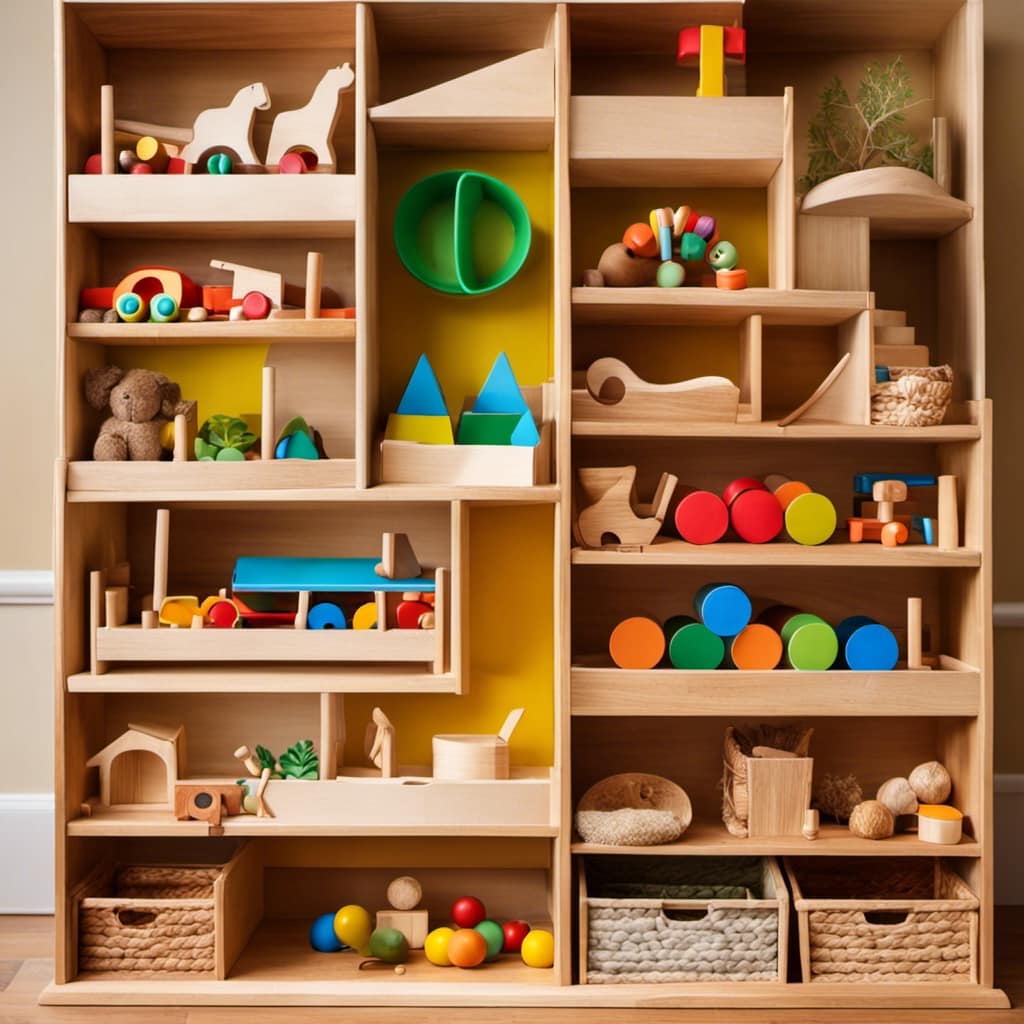As a parent, it is extremely important to me that the toys I choose for my child are safe and promote their development. That’s why I have taken the time to carefully research and select Montessori toys that are not only safe, but also aid in their growth and development.
In this article, I’ll be sharing valuable insights and tips on how to select toys that align with the Montessori philosophy of learning and independence. From avoiding safety hazards to prioritizing exploration and problem-solving, you’ll find everything you need to know to create a stimulating and safe play environment for your little one.
Key Takeaways
- Avoid safety hazards such as choking hazards and toxic materials.
- Discard non-developmental toys that limit creativity and imagination.
- Remove age-inappropriate toys that don’t foster independence.
- Common mistakes in choosing Montessori toys include neglecting developmental stage and interests, providing toys that are too advanced or simplistic, falling for overpriced brands, and not prioritizing toys that promote exploration, creativity, and problem-solving.
Safety Hazards to Avoid
I need to make sure to avoid toys with small or detachable parts that could be swallowed, as well as toys that contain toxic materials like lead-based paint or phthalates. Choking hazards are a serious concern when it comes to choosing toys for children. Small parts can easily become lodged in a child’s throat, leading to a choking incident.
It is important to carefully inspect toys and ensure that they are age-appropriate and free from any potential choking hazards. Additionally, toxic materials in toys can pose a significant risk to a child’s health. Lead-based paint and phthalates, commonly found in plastic toys, can have harmful effects on a child’s development.
It is crucial to research and choose toys that are made from safe and non-toxic materials to protect the well-being of our children.
Non-Developmental Toys to Discard
Battery-operated toys that do all the work for the child should be discarded. While they may seem convenient and entertaining, these toys can have negative effects on a child’s development.

Research has shown that battery-operated toys can limit creativity and imagination, as they provide predetermined actions and outcomes. Additionally, there is evidence to suggest that toys promoting violent behavior can contribute to aggressive tendencies in children.
It is important to choose toys that encourage open-ended play and allow children to use their own creativity and problem-solving skills. By discarding battery-operated toys and opting for more interactive and imaginative playthings, we can provide children with a safer and more developmentally appropriate play experience.
Age-Inappropriate Playthings to Remove
To ensure a child’s playtime is engaging and fosters development, it is important to remove age-inappropriate playthings that limit imagination and problem-solving skills. Inappropriate toys can have a negative impact on a child’s behavior and overall development.
Here are four types of age-inappropriate playthings that should be removed from a child’s play environment:
-
Battery-operated toys that perform specific actions: These toys leave little room for imagination and creativity, as they dictate how the playtime unfolds.
-
Toys with pre-determined outcomes: Toys like puzzles with only one solution hinder problem-solving skills, as they provide all the answers.

-
Toys that provide all the answers: Electronic devices that give instant solutions discourage critical thinking and exploration.
-
Toys that require constant adult assistance or intervention: Playthings that rely heavily on adult involvement limit a child’s independence and self-confidence.
Montessori Toys That Don’t Foster Independence
Removing playthings that do not encourage independence is crucial in creating an environment that fosters imagination and self-sufficiency.
When it comes to Montessori toys, it’s important to steer clear of battery-operated toys that perform specific actions, leaving little room for imagination. These toys often limit a child’s creativity and problem-solving skills, as they rely on pre-determined outcomes.
Additionally, it’s wise to avoid overpriced toy brands that claim to be Montessori-inspired. These brands often prioritize marketing and profit over the true principles of Montessori education, which emphasize open-ended play and the promotion of exploration and creativity.
Instead, focus on providing toys that allow children to explore, experiment, and discover on their own, fostering independence and a love for learning.

Common Mistakes in Choosing Montessori Toys
One mistake I often see when selecting toys for a Montessori environment is neglecting to consider the child’s developmental stage and interests. It’s crucial to choose toys that align with a child’s abilities and foster their natural curiosity. This not only enhances their learning experience but also promotes their overall development.
Another mistake to avoid is falling for overpriced toy brands marketed as Montessori-inspired. Expensive toys don’t necessarily guarantee a better learning experience. Instead, focus on the quality and functionality of the toys. Prioritize toys that encourage exploration, creativity, problem-solving, and independence.
Consideration of Developmental Stage and Interests
When considering toys for a Montessori environment, it’s important to take into account the child’s developmental stage and interests. Montessori education emphasizes the importance of providing age-appropriate materials that align with a child’s current abilities and interests. By understanding the child’s developmental stage, we can select toys that will challenge and engage them without overwhelming or frustrating them.
Additionally, considering a child’s personal interests can help us tailor the toys to their individual preferences, making learning more enjoyable and meaningful for them. Research shows that when children are given toys that align with their developmental stage and interests, they are more likely to engage in independent exploration, problem-solving, and creativity.
Avoiding Toys That Are Too Advanced or Too Simplistic
I should ensure that the toys I select are challenging yet suitable for my child’s abilities and interests. When choosing Montessori toys, it is crucial to consider my child’s abilities to avoid extremes of difficulty. Here are four reasons why this is important:
-
Frustration: If the toy is too advanced, my child may become frustrated and lose interest. It is important to choose toys that provide a challenge without overwhelming them.

-
Lack of Engagement: On the other hand, if the toy is too simplistic, it may fail to engage my child’s interest and hinder their development. Toys that are too easy can be boring and unstimulating.
-
Stunted Growth: Providing toys that are not suitable for my child’s abilities can limit their growth and potential. It is important to choose toys that encourage them to think critically and problem-solve.
-
Self-Esteem: When my child can successfully complete a challenging task, it boosts their self-esteem and confidence. By avoiding toys that are too advanced or too simplistic, I can help foster a positive sense of accomplishment in my child.
Prioritizing Exploration, Creativity, and Problem-Solving
Exploration, creativity, and problem-solving are key factors to consider when selecting toys for my child. Encouraging independent learning and promoting hands-on exploration are crucial for their development. Montessori toys, known for their focus on self-directed learning, can greatly support these aspects. These toys are designed to engage children in open-ended play, allowing them to use their imagination and explore different possibilities. By providing opportunities for problem-solving, children learn to think critically and develop important skills.
To emphasize the importance of these factors, here is a table showcasing the benefits of prioritizing exploration, creativity, and problem-solving in toy selection:
| Benefits of Prioritizing | Exploration | Creativity | Problem-Solving |
|---|---|---|---|
| Cognitive Development | ✔️ | ✔️ | ✔️ |
| Imaginative Thinking | ✔️ | ✔️ | |
| Decision-Making Skills | ✔️ | ||
| Self-Expression | ✔️ |
Frequently Asked Questions
What Are Some Examples of Non-Developmental Toys That Should Be Discarded?
Non-developmental toys, such as battery-operated toys that limit creativity, single-purpose toys that hinder imagination, and toys that promote aggression should be discarded. It’s important to identify age-appropriate toys that foster independence and promote exploration, creativity, and problem-solving.

How Can I Determine if a Toy Is Age-Appropriate for My Child?
To determine if a toy is age-appropriate for your child, evaluate its developmental benefits. Consider their skills and interests, and choose toys that encourage exploration, creativity, and problem-solving.
Can You Provide Examples of Montessori Toys That Don’t Foster Independence?
Sure, here are some examples of Montessori toys that don’t foster independence: battery-operated toys that limit creativity, puzzles with predetermined solutions, electronic devices that provide all the answers, and toys requiring constant adult assistance.
What Are Some Common Mistakes to Avoid When Choosing Montessori Toys?
Some common mistakes when choosing Montessori toys include neglecting the child’s developmental stage and interests, providing toys that are too advanced or simplistic, falling for overpriced brands, and not prioritizing exploration, creativity, and problem-solving.
Why Is It Important to Prioritize Exploration, Creativity, and Problem-Solving When Selecting Montessori Toys?
It’s important to prioritize exploration, creativity, and problem-solving when selecting Montessori toys. These qualities enhance a child’s cognitive development, encourage independent thinking, and foster a love for learning.
Conclusion
Well, folks, we’ve reached the end of our journey through the world of Montessori toys.
I hope you’re feeling enlightened and ready to make some wise choices for the little ones in your life.

Remember, safety is key, so let’s steer clear of those choking hazards and toxic materials.
And please, let’s bid farewell to those non-developmental toys that stifle creativity and imagination.
Say goodbye to age-inappropriate playthings that hinder independence and exploration.
And for the love of Montessori, let’s avoid those battery-operated toys with their predetermined outcomes.
So go forth, my friends, armed with knowledge and a discerning eye.
Choose toys that inspire, encourage problem-solving, and let those little minds soar.

Happy toy hunting!










